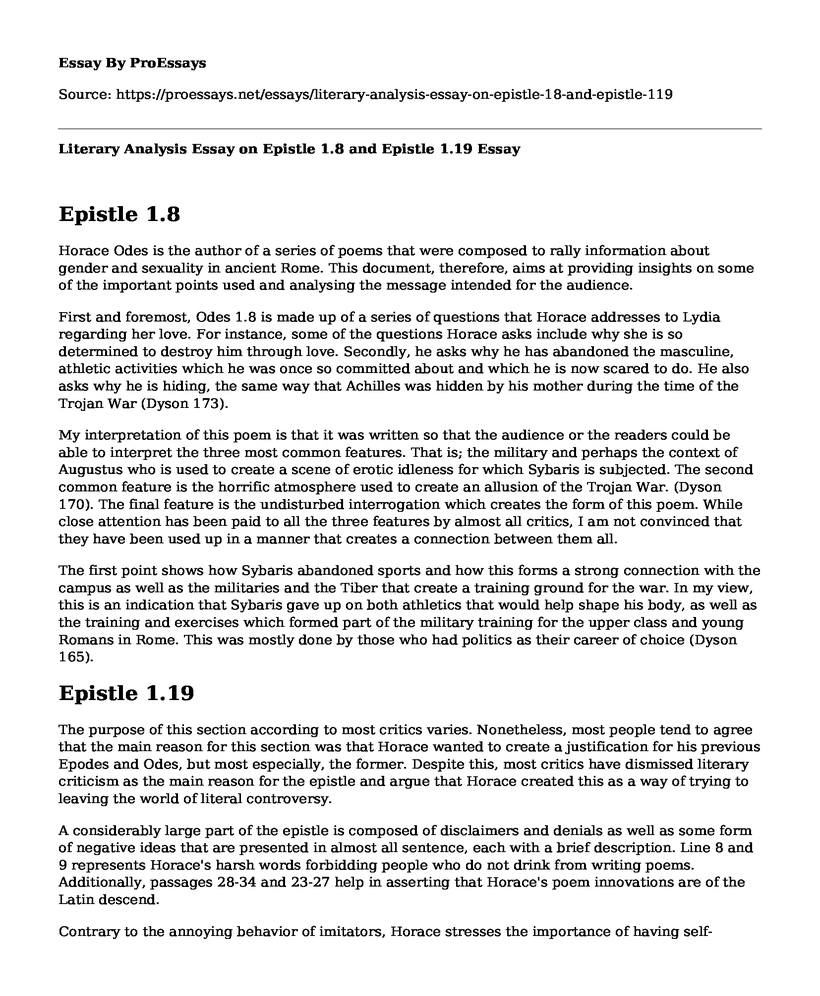Epistle 1.8
Horace Odes is the author of a series of poems that were composed to rally information about gender and sexuality in ancient Rome. This document, therefore, aims at providing insights on some of the important points used and analysing the message intended for the audience.
First and foremost, Odes 1.8 is made up of a series of questions that Horace addresses to Lydia regarding her love. For instance, some of the questions Horace asks include why she is so determined to destroy him through love. Secondly, he asks why he has abandoned the masculine, athletic activities which he was once so committed about and which he is now scared to do. He also asks why he is hiding, the same way that Achilles was hidden by his mother during the time of the Trojan War (Dyson 173).
My interpretation of this poem is that it was written so that the audience or the readers could be able to interpret the three most common features. That is; the military and perhaps the context of Augustus who is used to create a scene of erotic idleness for which Sybaris is subjected. The second common feature is the horrific atmosphere used to create an allusion of the Trojan War. (Dyson 170). The final feature is the undisturbed interrogation which creates the form of this poem. While close attention has been paid to all the three features by almost all critics, I am not convinced that they have been used up in a manner that creates a connection between them all.
The first point shows how Sybaris abandoned sports and how this forms a strong connection with the campus as well as the militaries and the Tiber that create a training ground for the war. In my view, this is an indication that Sybaris gave up on both athletics that would help shape his body, as well as the training and exercises which formed part of the military training for the upper class and young Romans in Rome. This was mostly done by those who had politics as their career of choice (Dyson 165).
Epistle 1.19
The purpose of this section according to most critics varies. Nonetheless, most people tend to agree that the main reason for this section was that Horace wanted to create a justification for his previous Epodes and Odes, but most especially, the former. Despite this, most critics have dismissed literary criticism as the main reason for the epistle and argue that Horace created this as a way of trying to leaving the world of literal controversy.
A considerably large part of the epistle is composed of disclaimers and denials as well as some form of negative ideas that are presented in almost all sentence, each with a brief description. Line 8 and 9 represents Horace's harsh words forbidding people who do not drink from writing poems. Additionally, passages 28-34 and 23-27 help in asserting that Horace's poem innovations are of the Latin descend.
Contrary to the annoying behavior of imitators, Horace stresses the importance of having self-confidence, as well as strict adherence to the models which lay out the standards for this particular technique. Throughout the rest of the text provided, Horace strives to distance himself from malice, a theme imported from literary satires.
As I continue analyzing this poem the more I tend to believe that the readers intended for this poem have never fully understood the degree to which poetic wine drinking creates a setting which goes way beyond line 11, when Horace appears to focus on other themes.
The setting of the poem thus not a symposium but instead a message of poetic imitation intended for Maecenas. The epistle 1.19 represents a kind of poem where the mixing of metaphors occurs. The mixing is somehow paralleled and extended into the final epistle 1.20 where the book turns into a slave desperately trying to run away from problems facing him/her, with the intentions of starting over and working hard to make it on their own (Warren 260). All through, this 'slave' is seen to possess and imitate the characteristics of the book which ideally can be sold in the market or bookstores, or one that can be read in the schools by students.
Despite this, it is evident that the concepts have been used figuratively because it would be absurd for Horace to engage in a conversation with a book which possesses no life whatsoever. Nor could this book escape from home and engage in prostitution (Warren 263).We are thus compelled to grasp the meaning of both the figurative and the literal meaning presented by Horace. Despite this, the figurative meaning appears much harder to grasp
Conclusion
In conclusion, therefore, this epistle poses several questions to the reader, for instance, the main reason why the poet insists on poetic wine drinking. Nonetheless, the poem has been rhythmically produced enticing the reader to continue reading each of the epistles. Additionally, the poet has successfully shown the role of gender and sexuality in ancient Rome
Works Cited
Dyson, M. "Horace, Odes 1.8: The Love of Lydia and Thetis." Greece & Rome 35.2 (1988): 164-171.
Smith, Warren S. "Horace directs a carouse: Epistle 1.19." Transactions of the American Philological Association (1974-) 114 (1984): 255-271.
Cite this page
Literary Analysis Essay on Epistle 1.8 and Epistle 1.19. (2022, Oct 21). Retrieved from https://proessays.net/essays/literary-analysis-essay-on-epistle-18-and-epistle-119
If you are the original author of this essay and no longer wish to have it published on the ProEssays website, please click below to request its removal:
- TEKS Standards for Mythology
- Compare and Contrast Essay on Works of Arts About the Vietnamese War
- American History Questions and Answers Paper Example
- Development of the Cold War - Essay Sample
- Essay Example on Latin America's Industrial Revolution: Nationalism, Unlawful Force, and Conflict
- Paper Example on Erving Goffman: A Canadian-Ukrainian Jew and His Rise to Fame
- Comparative Analysis of John Brown and Timothy McVeigh: Terrorism, Motivations, and Methods







